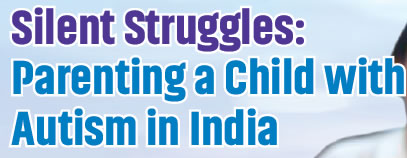Parenting a child has been used to describe as a path filled with happiness, exploration, and sacrifice. However, for parents of children with autism living in India, the path is more often desolate, costly, and psychologically demanding. Even as awareness increases, the struggles of such families are more often masked by social stigma, inadequate infrastructure, and a vacuum of systemic support. Based on estimates by the Indian Council of Medical Research (ICMR), autism spectrum disorder (ASD) occurs in approximately 1 out of every 100 children in India—a figure that amounts to over 2 million people. But autism in India is still very much a mystery, and the caregiving burden largely rests with families.
Emotional Toll:
Stigma, Stress, and Silence In India, an autism diagnosis is not only a medical term—it is a social taboo. Parents tell us that they have been blamed for their child’s behavior, isolated by extended family members, and confronted by neighbors or teachers who attribute autism to “bad parenting” or “naughtiness.” According to a 2021 study in the Indian Journal of Psychiatry, over 60% of autistic children’s mothers suffer from depression and anxiety symptoms. Fathers also experience emotional distress due to social isolation or due to the internalisation of social stigma.
Financial Strain:
High Costs, Low Coverage In a nation where public healthcare facilities are overextended, families go to private facilities for diagnosis and therapy. These don’t come cheap. ABA therapy, occupational therapy, speech therapy, and special education may range anywhere from 15,000 to 50,000 per month, depending on the provider and the city. Parents shell out of their pocket, frequently depleting their savings or borrowing money. A survey conducted by Action For Autism (AFA), a premier autism advocacy group in India, discovered that more than 70% of families consider autism care unaffordable in the long run.
The Cultural Challenge:
Autism vs. Awareness Autism in India remains largely misunderstood. In certain communities, there are still myths that autism results from “past-life karma” or that the child will “outgrow it.” Caregiving falls squarely on the mother, who might also be pressured to attempt “alternative” treatments with no scientific backing–ranging from ayurvedic cleanses to spiritual healing.
Cultural stigma isolates these families even further. Birthday celebrations, school activities, and even temple attendance can become guilt-ridden experiences where parents are judged or ostracized.
Signs of Hope:
Building Resilience and Networks. In spite of the barriers, Indian parents are coming forward as strong champions of their children. NGOs such as AFA (Delhi), Tamana (Delhi), Ummeed (Mumbai), and Communication DEALL (Bangalore) are equipping families with skills, training, and facilitation. Early intervention centers need to be scaled up, particularly in small cities. Inclusive education should be mandated with teachers’ and school administrators’ training.
Mental health services should be accessible and affordable for caregivers. Stigma-busting campaigns should be employed to educate families and communities in local languages.
Autism is not a curse. It is another way of experiencing the world. But for Indian parents of autistic children, the journey need not be one that they must undertake alone.


